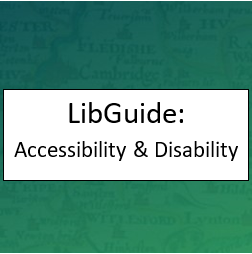
This website gives details of the many assistive resources and services available to anyone wanting to use the Chemistry Library. It is designed to help you get started and consider any adjustments you may need. If there are any others you feel we could provide please contact us.
This is a new website and a work in progress - your feedback is important.
The following topics are covered (accessible via the links in the left-hand menu bar):
-
Library space and how to access it: A helpful guide to our library space and what to expect. It includes key accessibility features.
-
Library orientation: Where to find library induction information.
-
IT support: IT facilities available in the library and links to other sources of assistive technology support.
-
Help with printed items (books and journals): Borrowing and returning books, extended loans, book fetching and book/journal scanning services.
-
Help with electronic resources (ebooks, ejournals, databases): Useful links to help you access these.
-
Non-Medical Helpers: How we can help your Non-Medical Helper support you.
-
Library anxiety is a thing: What it is and how to beat it.
Assistive Equipment in the Chemistry Library
We are building a collection of assistive equipment for our users.
In the main library space you can find:
-
book rests
-
reading rulers and overlays in a range of colours
-
computer stands
-
an A5 magnifying sheet
-
a standing desk convertor
Ask at the library office for:
-
coloured A4 paper
-
ergonomic keyboards
-
ergonomic mouse
Please let us know if you need something specific to support you.
Other university and library services that are available to help you
Accessibility and Disability Resource Centre (ADRC)
The university's Accessibility and Disability Resource Centre can help with support, advice and resources. By registering with the ADRC you can get access to disability support and resources available throughout the university; you may also be entitled to a Non-Medical Helper [internal link].
Cambridge Libraries
The Libraries Accessibility Service has created an accessibility & disability LibGuide. This pulls together information about accessibility services (including accessible readings, catalogues and reading lists, eresource platforms, assistive technology) and signposts sources of help.
The Engineering Library nearby on Trumpington Street has accessible (lone and group) study spaces for use by any member of the university.
The University Library on West Road has bookable assistive technology rooms and software/equipment. The UL also has an Accessibility and disabled library users website which provides information on accessible services available there.
Try using SpaceFinder to locate study spaces available in Cambridge Libraries and other venues around the city.
Wellbeing
The Department, the Chemistry Library, and other Cambridge University Libraries have Wellbeing services and collections, please visit our Wellbeing website for more information.
Note on Equality, Diversity & Inclusion (EDI)
The Department's Committee for the Library and Scholarly Communication has completed an audit of EDI related activities and resources at the Chemistry Library and Cambridge University Libraries. It aims to identify gaps in our EDI provision and measures that can be taken to fill these gaps. It will be published soon and will be a living document; your input will be a vital part of helping us achieve better EDI for all of our library users.
The ACS Guide to Scholarly Communication
Part 6 of the ACS Guide to Scholarly Communication includes the open access ACS Inclusivity Style Guide section which has been developed 'to help people communicate in ways that recognize and respect diversity in all its forms'. Accessibility is one of the topics covered, along with Age, Disabilities, Disorders, & Other Health Conditions, Gender & Sexuality, Race, Ethnicity, & Nationality, Diversity & Inclusion in Images, Accessibility, Socioeconomic Status, Forms. Please visit this ebooks@cambridge blog post for further information on the Guide.
